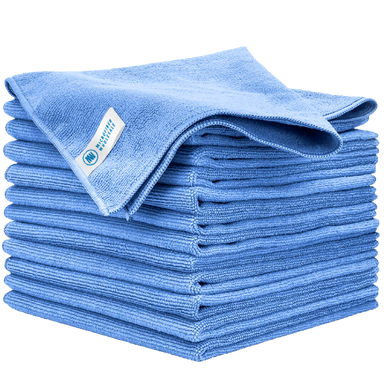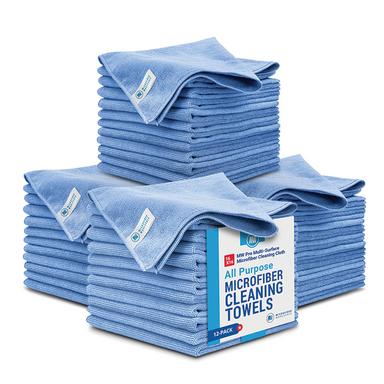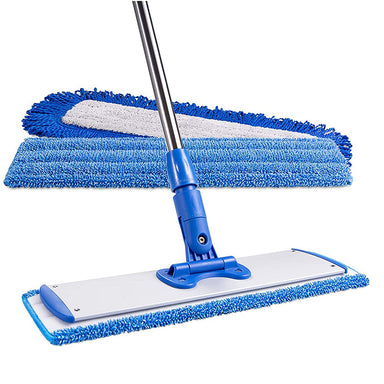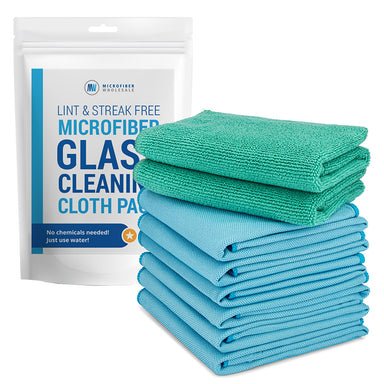Listen to this Show and Learn:
- How to educate potential customers about the importance of doing business with a properly insured and incorporated cleaning business.
- Why it’s important to clean yourself for estimating job timing.
- How the durability of microfiber makes them more valuable than traditional terra cloths.
- How Eugene uses charging buckets to preserve increase efficiency and preserve his team members’ backs.
- The 80/20 to preserving your microfiber products.
Mentions:
Marcus Lemonis: The Prophet
Microfiber Towels
Microfiber Mops
Microfiber Charging Buckets
ProTeam Backpack Vacuums
Transcription:
[Welcome to the MicroFiber Wholesale show where we talk with cleaning professionals about how to better run and grow your cleaning business. To learn more about who we are and what we do, visit us at microfiberwholesale.com.]
Host: I’m here with Eugene from Total Cleaning Associates. So Eugene, tell us a little bit about your business, how you got started and just kind of what it looks like today.
Eugene: Well, it started out as a part time gig cleaning with one account which was Gateway Computers in Paramus. I never really wanted to get too much into it until they opened up a few more stores and I got more into it. Then I decided I had to hire somebody and that’s how it kind of started but I was always into it on a part time basis because I really wasn’t crazy about the hours and I was doing construction management and supervision for a commercial construction site as a full time gig.
But against my better luck, some more accounts started coming in. I partnered up with an uncle of mine and he had a cleaning business and he needed help. Between my business and his business, it turned into a seven-day, 12- to 14-hour a day workweek. Further than that, I like the action. I enjoy getting a new account. You never lose that feeling when somebody calls you and they want your services and you just do it. Just do what has to be done for the client and your employee and yourself which incidentally is the last person that you have to think about.
Host: So how long have you been in the industry then?
Eugene: I’ve been in the industry since 1994. It’s when I first incorporated.
Host: Okay. So looking back now over the last 20 years, what would you say is the biggest challenge you ran into? What’s been the biggest challenge to getting the business to where it is now?
Eugene: I think the biggest challenge that comes to mind is the competition. Competition coming from your small mom and pop operators to work with one vacuum out of their trunk and maybe some store chemicals. They don’t have workmen’s compensation. They don’t carry liability insurance or any of the other expenses associated with running a business with multiple accounts and employees. That’s the biggest challenge of course. I go in with a $100 item, they can do it for $50.
Host: So how have you dealt with that? How have you managed to compete against those types of competition?
Eugene: Well, you really just have to hope to win, to try to convince the prospect that this is the better way to go because if something should happen to the employee or your property, that we’re cover with insurance. Try not to be penny foolish when choosing a contractor. It’s important to choose the right contractor and even if it’s all a bit more money, you should have a little bit more–be able to go home and put your head in the pillow and go to sleep.
Host: And so, is that typically something you always bring up in the sales conversation just to make sure they’re aware, or how do you kind of build that into the business?
Eugene: Well, if somebody tells me, if I have a good relationship with a prospect and I go in, let’s say, with 1,000-dollar a month service proposal and they’re getting it done for $700 a month, that’s going to bring it up, make sure that my competitors carry the proper insurance and that they’re using a proper [unclear 03:14] proper equipment and of course the proper mops and the proper towels.
But you can’t really get away from it too much because you got a customer that just all they’re concerned about is our pricing. At some point, you just got to walk away and stop hanging. I gave my best price within my market and if you want to go for something like that, then I’ve done everything I could.
Host: But yeah, it sounds like you do your best to educate them on what the liabilities they’re facing on and what the kind of advantage are and then you have to let people obviously decide for themselves.
Eugene: Yeah. They’re all going to be the person writing the check and making the decision. As long as you gave him all of your information, all information that they need to make a decision, if I don’t get the account and within the market, I’m like, “Okay fine. Let me go find somebody else.”
Host: What would you say is the biggest lesson you’ve learned running Total Cleaning Associates, looking back?
Eugene: The biggest lesson, how important to be responsive to customer quality issues and service requests that go above and beyond the regular schedule janitorial. It’s important to be as responsive as you can. And if you can’t, be as honest as you can with saying why you cannot do something if there’s somebody who needs, you have staffing issues or scheduling issues for the certain client as they require like an emergency cleaning of a carpet. But I haven’t run into that too much really. I try to keep my business concentrated on the nighttime schedule, janitorial, building service contract at your business.
Host: Give a specific story you can think of when you’ve been able to kind of deal with the client in that way and manage the situation well?
Eugene: Another thing that comes to mind right away–oh wait a minute. There was a client that I had about three or four years ago and they had a pipe broke and it slutted the bathroom downstairs and went into an adjacent room that had, I think, was like 100 or 200,000-dollar blood testing equipment. The gentleman I had that I worked with who does my carpet work and my floor work wasn’t able to handle it but I was able to contract with an outside contractor.
I didn’t make any money but I was able to service my client and of course, I ended up getting the common area cleaning for a small office building. If pipes got broke in my area that I always clean on a nightly basis for the client upstairs. It’s something bad like that that it actually happened to work out in my favor. I still have to do cleaning and now like–I’m sure there’s something that I can’t remember now where I quit service and then you just have to be honest with your client whether they want to hear the truth or not and try not to fabricate a story. The best thing you do is just be honest even if they don’t want to hear it.
Host: And that’s a great example because I know that’s something we talked about a lot too like, you went above and beyond. I’m not surprised at all that you picked up another account and they’re still an account now because obviously that really shows the trust and the effort you put into the work that’s going to make that relationship.
Eugene: When you get a little bit of fear in you sometimes, the little stress sometimes either you sink or you swim and that situation happen to work out in my favor. It was a very stressful situation. I’m trying to service my client and of course somebody who’s not even like, buying and it worked out well. Now, I got to say it worked out well. You know what? It doesn’t always happen that way.
Host: It doesn’t, but I think you’re at a point where you’re trying to approach it from doing the right thing and when you came to the right thing for capacity issues, you’re really just too close. You’re just being upfront and honest about that, it tends to work out in the long run.
Eugene: It does. It does. You try to say you go by the model like mark this little miss from their profit. Every service, everybody, every kind and sometimes, you just can’t. You just can’t service everybody every time.
Host: You’re certainly setting your goals down. So I think people recognize that intention and they appreciate it.
Eugene: Yes, I agree.
Host: But if you were speaking with another cleaning company, maybe one that was struggling, they’re a smaller cleaning company looking to grow, what’s the number one tip or number one piece of advice you would give them?
Eugene: If somebody’s looking at starting up a cleaning business, I would say make sure administratively, you have your proper insurance to handle it and clean yourself because when you clean yourself, you’ll know how much time an office takes. I mean, right when I first started, when I was cleaning myself, I would time myself how long it took me to empty a garbage can and change the linen.
And then when I go and do an estimate, I always count the garbage cans and I kind of have an idea of how long it’s going to take. I always say make sure you’ve find out how far the garbage dumpster is before. Time all your tasks. And if it takes you two minutes, make it four minutes because when you hire somebody, when you hand it off, when you hire somebody, they’re not going to be as fast as you are. So you have to be lenient with the time.
Host: Is that generally what you found? That if you hire someone, they take twice as long as you do? Is that a good rule of thumb?
Eugene: Not twice as long. It’s kind of a lot but always put a little buffer on there.
Host: Yeah.
Eugene: Like, I read on a website for cleaning times, toilet bowl was like, three minutes. Three minutes for a toilet bowl. I always challenge people like, if they say three minutes in the toilet bowl, go inside the bathroom and look at that toilet bowl for three minutes. And then clean it and see how long it takes to clean the toilet bowl. Of course, unless if it’s actually disgusting and soiled. But always time your tasks to come up with an idea of how long it’s going to take. At the end of the day, it’s all down to experience.
Host: Do you have a specific strategy or process for how you clean a building?
Eugene: Yes. We just started a large company on Monday night. It was about a 20,000 square-foot company. I’m partnered in it with an uncle of mine. The best thing to do–we were talking about strategizing with the garbage because there’s maybe two or three hundred garbage cans in there.
We just started the farthest end of the building, work your way towards the location where your dumpster is instead of starting—locate all your equipment where you start cleaning, where you’re entry point is and then go from the farthest end of the building and work your way to the end point of a building. But this one happen to be strategically a good place because the dumpster is right–it’s in a warehouse and it happen to be, it worked out that well.
Host: So you generally go room by room and then not cleaning tool by cleaning tool.
Eugene: Pardon me?
Host: You generally go room by room and not cleaning tool by cleaning tool then.
Eugene: Yes, yes. We try to do–we’re figuring out where you’re going to start the night job and trying to keep it within your hourly budget.
Host: Well, one of the things I always talk about too, is kind of how you use Microfiber just as a way to educate people about how the products kind of works so walk us through how you use Microfiber mops, towels, Microfiber products, and what you found to be most effective for using them.
Eugene: Well, when we first started out, we were using a lot of the terry cloth towels from Home Depot which don’t wear as well but that was really kind of–when we started, that was the only thing available to us and then of course, we went on to Microfiber which we found it to be more durable, a lot better clean, better wear and tear when you wash them in machines especially commercial machines. And of course, the quality of the towel itself, it doesn’t rip as much as the terry cloth towels that we’re getting. So therefore cost is–even though they’re a little bit more expensive, you hold on to them for much longer amount of time.
Host: Do you find any difference in the quality of Microfiber itself, or certain Microfibers do you notice they last longer or they’re more effective?
Eugene: Well, I’m not to sound like a commercial for Microfiber wholesale but these Microfiber towels have much better quality and they have lasted longer. If I go and get them, if I’m adding some and I’m going to need them in a pinch I go to the big box retailer and get them. They have them but they’re not going to last as long and the quality is not a good one. When you put them side by side, comparing the quality to getting them from Microfiber Wholesale as opposed to getting it from your [unclear 11:31]. And they do last a lot longer and they do hold the color a lot longer.
When it comes to mops, I like them because we’re not using that much water as opposed to the traditional string mops. You do end up cleaning I think more of a room quicker because of the 18-inch wide and it’s not as heavy and you’re not using your back as much to using a wringer to get all the water out.
And what’s good with the Microfiber, when we have the charging bucket and we try our best to not cross-contaminate or bring dirty water into the next room so we kind of use the rule of thumb, use a mop for one or two rooms, put it in a bag, in a laundry bag, in order to minimize time with going to change water because with the traditional mopping methods, to try to get your staff to change water in a big facility is a challenge in itself as opposed to loading up a charging bucket with seven or eight towels and then you don’t soil the water as quickly and you’re not cross contaminating. You’re not bringing dirt from Room A to Room B but that’s a huge huge benefit.
Host: Because you’re able to use the charging bucket, you feel like you get more efficiency out of your cleaning crew.
Eugene: You do. The chances of them changing the water at especially if it’s a big facility, it’s slim to none. So with this system, the Microfiber system, you can fill the charging bucket up with water, solution, and however many mops you need and it’s a better clean. It’s a better quality clean.
Host: Yeah, that’s certainly what we’ve seen as well, and I appreciate what you said about the quality. We do some pretty serious quality control because we have seen there is a pretty good variation in terms of how long the products last. But I was wondering, do you have any tips for extending the life of Microfiber products? Is there anything specific you do to get more out of them?
Eugene: Constant washing. That’s it. Try not to use them without washing for any extended period of time, but just proper care, proper washing. Listen, at some point, I don’t care what it is, what product you’re using. You’re going to have to exchange and get new ones and recycle the old ones.
Host: Sure. Always best to get the most life out of your products as you can. Obviously as you said, taking care of them appropriately. Are there any other products, Eugene, that you use day to day in running your business? Like, any other useful tools you’d recommend to other cleaning companies? It could be software. It could be other physical equipment. What are you using right now that you’re really enjoying?
Eugene: Right now, I do get a lot of the backpack vacuum, the smaller backpack vacuums. They’re easier to store. Good quality. I get it from Pro-Team. My female staff members, they like them better because it’s not such as heavy thing. If they wanted to, they can carry it in one arm and use the one in the other arm. They’re a lot better to store as well.
That’s pretty much one of my–I don’t know, I call it signature equipments that I use. It’s the backpack vacuum. You can cover more area, get under desk. It’s easier with them than your upright. I use a lot of upright as well like any other cleaning company when there’s more of a carpet and it’s good for you to be upright because the pressure’s kind of loosening up the dirt that’s a little bit more embedded in the carpet than a typical backpack vacuum.
Host: Yeah, that’s a great tip. Well, Eugene, one of the things we’d like to do in these interviews is kind of talk about what you see and what we can learn from you about how we’re doing business or why—how did you find Microfiber wholesale and what keeps you coming back?
Eugene: I found Microfiber wholesale I believe on a google search because I was looking for something with a better quality. There was nothing around here in my area that I found quickly and there were plenty of places to deal with but you just have to research one, look at one, and pick one and call them up, see what the price point is and check out the quality. That was pretty much it.
I think I have a very good relationship with those gentlemen out there. Very personal guys. I’m happy to have them in my list of suppliers. There’s no reason to go with anybody else. I mean, can I go and get a better pricing? You know what? At what cost? If I’m dealing with somebody as far as product is concerned and equipment and I’m trying not price everybody out of the market and just got to deal with your family of business associates and keep it at that. It just saves you a lot of time and aggravation and start looking up around.
Host: Thank you. We appreciate it. I know Brett and Irene will smile when they hear that. But you have found the products durable in terms of how many washings you’re getting out of them compared with other Microfiber you’ve used?
Eugene: Oh, completely. Oh, yeah. Yes. As a matter of fact, I just started buying the Microfiber charging bucket and the mop handles from Microfiber wholesale and I just started a fairly large ambulatory surgery center and I always use Microfiber.
And I was using Rubbermaid since I started. I like to go in there with the Rubbermaid name but at some point, their pricing became a little bit ridiculous and I started, “You know what? Let me try their equipment” and that’s it. I bought. They’re my new supplier for equipment, for Microfiber equipment, not just the mops and the towels.
Host: Well, awesome. Very happy to hear that. Is there anything you haven’t found or is there anything else we should consider stocking?
Eugene: Not that I can think of right now. I think you guys have pretty much everything that I need right now.
Host: Awesome. Well, again, that was Eugene from Total Cleaning Associates. So thanks for talking with us today, Eugene, and thanks to everyone for listening. To know more about who we are and what we do, visit us at microfiberwholesale.com.
[end of audio]
















